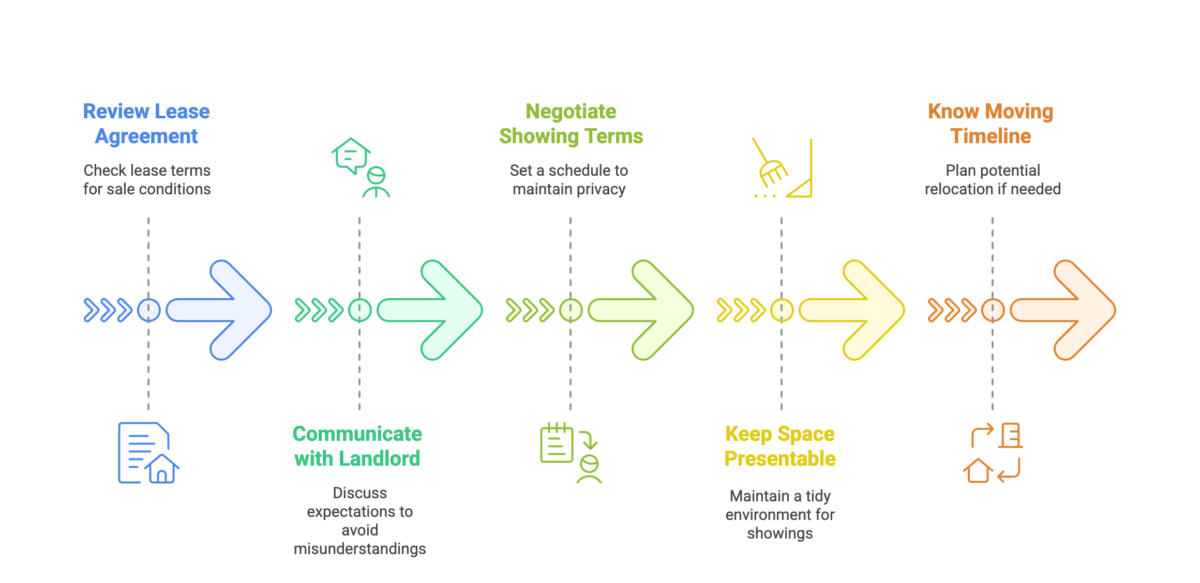What Tenants Need to Know When Their Rental Home is Being Sold in BC
Why This Matters
If you’re a tenant in British Columbia and your landlord has informed you that the property you live in is being sold, you’re probably wondering:
- What does this mean for me?
- Do I have to move?
- Can I refuse showings?
- How much notice do I get?
These are all valid concerns.
As someone who has been a tenant, landlord, homeowner, and real estate agent representing both buyers and sellers, I’ve seen all perspectives of this process. My goal here is to ensure you understand your rights and responsibilities so you can navigate the sale with confidence.
Let’s break down what you need to know, how to prepare, and what to expect.
Step 1: Understand Your Rights as a Tenant in BC
British Columbia has strong tenant protections under the Residential Tenancy Act (RTA). Here are the key rules:
Can Your Landlord Sell the Property While You’re Renting?
Yes. Landlords have the legal right to sell a tenanted property at any time. However, the new owner must honor your lease agreement if you’re in a fixed-term tenancy (e.g., a 12-month lease).
Do You Have to Move?
If you are on a fixed-term lease, you cannot be forced to move before the lease ends unless:
- The lease allows for early termination upon sale (rare).
- You and the landlord mutually agree to end the lease early.
If you are on a month-to-month lease, you may be required to vacate if the new owner intends to move in.
How Much Notice Must You Be Given?
- If the new owner (or their close family member) plans to move in, they must provide you with a Two-Month Notice to End Tenancy (Form RTB-32).
- Your landlord must also compensate you with one month’s rent for the inconvenience.
- If the new buyer is an investor and plans to keep you as a tenant, nothing changes—you can stay under the same terms.
Official Resource: BC Residential Tenancy Branch: Selling a Tenanted Property
Step 2: Showings & Open Houses – What Are Your Rights?
Selling a home often means prospective buyers will want to see the property before making an offer. Here’s what you should know:
Can Your Landlord Show the Property Without Your Permission?
No. Your landlord must provide you with written notice at least 24 hours in advance before any showing. The notice must include:
- The date and time of entry
- The reason for entry (e.g., a showing or open house)
- The name of the person entering (e.g., a realtor)
Do You Have to Allow Open Houses?
No. Under BC law, open houses can only happen with your consent. You have the right to decline if you don’t want large groups of people touring your home.
Can You Set Boundaries for Showings?
Yes. Many tenants negotiate showing schedules to minimize disruptions. Common agreements include:
- Limiting showings to specific days/times.
- Requesting a minimum amount of notice (e.g., 48 hours instead of 24).
- Asking for no showings on certain days (e.g., weekends).
Step 3: How to Prepare for the Sale Process
Even though this process can feel stressful, being proactive helps you stay in control. Here’s how to prepare:
Review Your Lease Agreement – Double-check your lease term and whether it allows for early termination upon sale.
Communicate with Your Landlord – A respectful discussion about expectations can prevent misunderstandings.
Negotiate Reasonable Showing Terms – Set a schedule that works for you to maintain privacy and minimize disruptions.
Keep Your Space Presentable – While you’re not required to stage the home, tidying up can make the process smoother.
Know Your Moving Timeline – If you’re on a month-to-month lease, start thinking about potential relocation plans just in case.

Step 4: What Happens After the Sale?
If the Buyer is an Investor (i.e., they want to keep renting the property):
Nothing changes—you continue paying rent to the new landlord. The lease terms stay the same unless you negotiate a change. You will be notified where to send rent payments and whom to contact for maintenance.
If the Buyer Wants to Move In:
You will receive a Two-Month Notice to End Tenancy. Your last month’s rent is free (landlord must compensate you). You must vacate by the move-out date unless you negotiate an extension.
People Also Ask (FAQ Blog Coming Soon!)
Can my landlord sell the property without telling me?
🔹 Can the new owner increase my rent?
🔹 What if I refuse to leave after receiving notice?
🔹 What if my lease says I can be evicted upon sale?
(Stay tuned for a separate blog post answering these in detail!)
Final Thoughts: Stay Informed & Be Proactive
Having your rental home put up for sale can feel unsettling, but knowing your rights and options makes all the difference. BC tenancy laws are designed to protect you, and understanding them will help you navigate this transition smoothly.
Are you a tenant in Metro Vancouver facing a sale? Have questions about your rights? Reach out to us today for expert guidance!